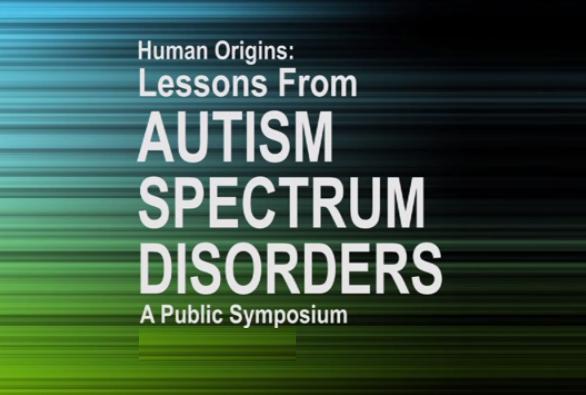Human Origins: Lessons from Autism Spectrum Disorders
Autism spectrum disorder (ASD) is very commonly diagnosed these days, possibly due to increased awareness. Or are these signs that the human brain is developing in new and different ways that have yet to be understood? What have advances in our understanding of the etiologies of ASD taught us about its mechanisms, and can they shed light on the evolution of the human brain? The CARTA public symposium on "Human Origins: Lessons from Autism Spectrum Disorders" featured scientists from many diverse fields, including genetics, neuroscience, psychiatry, cognitive science, psychology, and evolutionary biology, who shared their insights into ASD - providing a multidisciplinary perspective on this multifaceted spectrum of disorders, and its implications for understanding human origins and the evolution of the human mind. (from carta.anthropogeny.org)
 |
Genetic Etiology
In this presentation, Jonathan Sebat (UC San Diego) points out that the biggest known risk factors for autism are genes.
Surprising Findings in Autism: Insights into Anthropogeny?
Although the neurobiology of autism has been studied for more than two decades, the majority of studies have examined brain anatomy 10 or more years after the onset of clinical symptoms.
The "Like-Me" Theory for Connecting Self and Others
Andrew Meltzoff (Univ of Washington) describes new research on the origins of 'social cognition' and its implications for understanding children with autism spectrum disorders.
The Early Identification of Autism: Examinations of Brain and Behavior
This lecture demonstrates how early screening at the 1st birthday can positively impact the search for biomarkers and lead to new discoveries regarding the study and treatment of autism.
Mirroring in the Neurotypical and Autistic Brain
In this talk, Mirella Dapretto (UCLA) begins by describing the relevance of mirror neurons for social functioning.
Systems Biology of Autism Spectrum Disorders
Daniel Geschwind (UCLA) and his colleagues have been working to identify autism risk genes and understand how these might lead to autism spectrum disorders (ASD).
The Evolutionary Biology of Autism Risk
Bernard Crespi (Simon Fraser University) describes a simple model, based in evolutionary biology, neurodevelopment, and genetics.
The Fetal Androgen Theory
Autism affects males much more often than females. The explanation for this must either lie in diagnostic practice, hormones, genetics, or (most likely) a mix of all three factors.
Mirror Neuron Dysfunction in Neurology
V.S. Ramachandran (UC San Diego) explains how his interest in Autism Spectrum Disorders (ASD) stems from an earlier, and broader, interest in mirror neurons and their dysfunction (and restitution of function) in neurology.
| Related Links |
| Origins of Genus Homo This symposium explores evidence bearing on the emergence of our genus, focusing on possible antecedents to Homo, changes in diet and body form as Australopithecus evolved toward Homo, ancient species within the genus, and evolutionary processes likely operating 2.5 - 1.5 million years ago. |
| Autism and Related Disorders The goal of this series is to make all of the lecture content and supporting materials available online for free for anyone who desires to learn about Autism Spectrum Disorders. |
| Autism Spectrum Disorder: Many Questions, Many Answers Autism Spectrum Disorder (ASD), a developmental disorder that often interferes with a person's ability to communicate with and relate to others, affects about 1 in 68 school-age children. |
| Is the Human Mind Unique? Scientists from many different fields gathered to discuss cognitive abilities often regarded as unique to humans including humor, morality, symbolism, creativity, and preoccupation with the minds of others. |
| Introduction to Psychology Providing a comprehensive overview of the scientific study of thought and behavior, this course explores topics such as perception, communication, learning, memory, decision-making, religion, persuasion, love, lust, hunger, art, fiction, and dreams. |